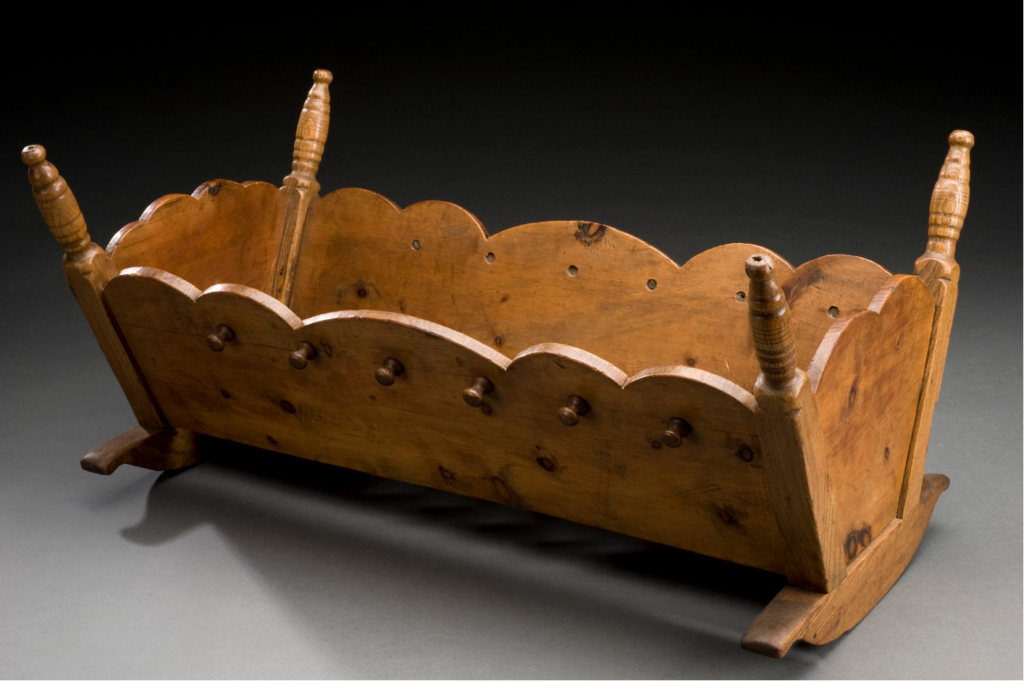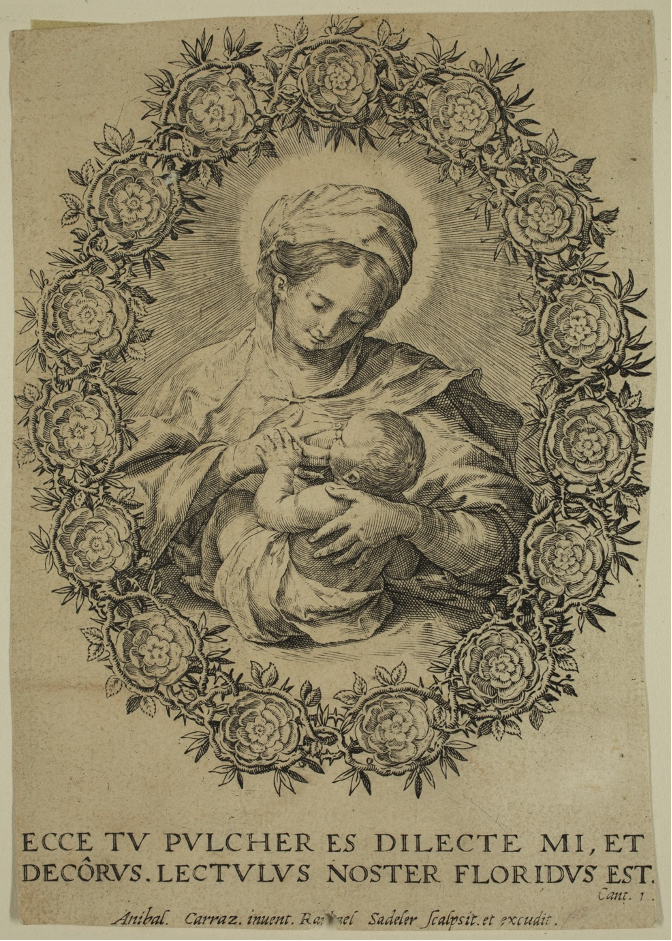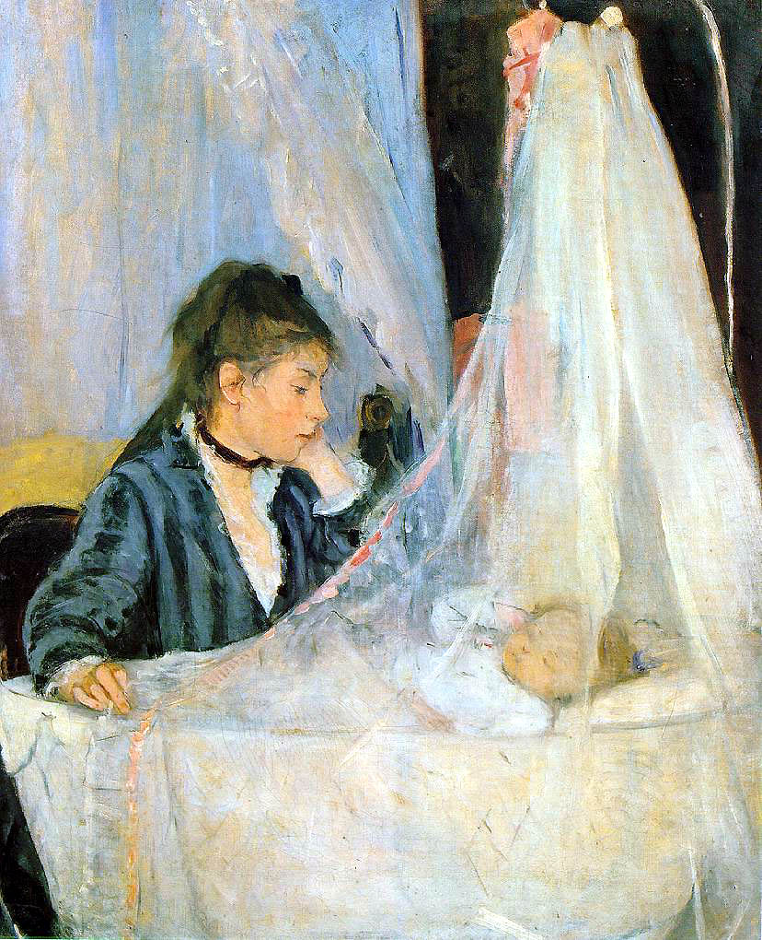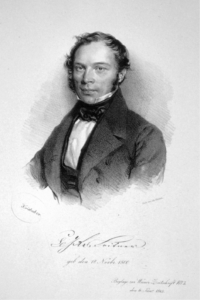In front of my cradle
(Poet's title: Vor meiner Wiege)
Set by Schubert:
D 927
[between autumn 1827 and early 1828]
Das also, das ist der enge Schrein,
Da lag ich einstens als Kind darein,
Da lag ich gebrechlich, hülflos und stumm,
Und zog nur zum Weinen die Lippen krumm.
Ich konnte nichts fassen mit Händchen zart
Und war doch gebunden nach Schelmenart;
Ich hatte Füßchen und lag doch wie lahm,
Bis Mutter an ihre Brust mich nahm.
Dann lachte ich saugend zu ihr empor,
Sie sang mir von Rosen und Engeln vor,
Sie sang und sie wiegte mich singend in Ruh
Und küsste mir liebend die Augen zu.
Sie spannte aus Seide gar dämmerig grün
Ein kühliges Zelt hoch über mich hin.
Wo find ich nur wieder solch friedlich Gemach?
Vielleicht, wenn das grüne Gras mein Dach.
O Mutter, lieb Mutter, bleib lange noch hier,
Wer sänge dann tröstlich von Engeln mir?
Wer küsste mir liebend die Augen zu,
Zur langen, zur letzten und tiefesten Ruh?
So that is it, that is the narrow coffin
In which I once lay as a child.
I lay there frail, helpless and dumb,
And I only moved my twisted lips in order to cry.
I could not hold anything with my tender little hands,
And anyway I was bound up as if I were a trouble-maker;
I had little feet, and yet I lay as if lame,
Until my mother took me to her breast.
Then I smiled up to her as I suckled,
She sang to me about roses and angels.
She sang, and as she sang she rocked me to sleep,
And lovingly kissed me on the eyes.
With light-green silk she stretched
A cooling tent high above me;
Where will I find such a peaceful chamber again?
Perhaps when the green grass is my roof.
Oh mother! dear mother, remain here for a long time to come;
Who could sing so comfortingly to me about angels?
Who would lovingly kiss me on the eyes,
To my long, to my last and deepest sleep?
All translations into English that appear on this website, unless otherwise stated, are by Malcolm Wren. You are free to use them on condition that you acknowledge Malcolm Wren as the translator and schubertsong.uk as the source. Unless otherwise stated, the comments and essays that appear after the texts and translations are by Malcolm Wren and are © Copyright.
☙
Themes and images in this text:
Angels Coffins Cradles Eyes Feet Food, feeding and nursing Going to bed Graves and burials Grass Green Hands High, low and deep Kissing Lips Lullabies Mother and child Roofs Roses and pink Silk
The German word for ‘a lullaby’ is ‘eine Wiegenlied’, literally ‘a cradle song’. Leitner’s ‘Vor meiner Wiege‘ could be the first cradle song that is primarily concerned with the cradle itself rather than with the baby being rocked to sleep within it! As was more or less traditional in German and Austrian lullabies, though, the poet is also writing about death. This is due to the visual similarity between the cradle and a coffin, and the inevitable association between going to sleep and dying. In cultures where babies were swaddled (and Leitner, born in 1800, makes clear that he was) people would have been reminded of corpses wrapped in a shroud ready for burial. The high incidence of infant mortality only served to underline the connection.

Credit: Science Museum, London.
Leitner evokes (he can hardly claim to remember) what it must have been like to lie in the cradle. He lists the incapacities and indignities that define the life of the infant: hands that cannot yet grip anything, feet that he cannot stand on, lips that cannot form speech only screech. (Schubert decided to remove the reference to the lack of bladder control, which he might have felt did not really give itself to music). All of this serves to underline the baby’s total dependence on his mother, for food, comfort and security.
The poet was a devout Catholic (from Styria, a bastion of traditional piety), so his depiction of the mother and her infant is suffused with the imagery of the Madonna and child. In this tradition (unlike in some forms of Protestantism) there was no embarrassment when it came to portraying breast-feeding, so Leitner has no qualms about describing the details of suckling. The angels and roses that appeared in the lyrics of her lullaby were also frequently depicted in Renaissance and Baroque images of the Virgin and Child, of course.

https://www.dia.org/art/collection/object/virgin-suckling-child-60149
The flip-side of this iconography is the pietà: the image of Mary in her distress weeping over the dead Christ. Leitner ends his ‘cradle song’ by expressing the wish that his own mother will survive him so that she can rock him to his final sleep when he closes his eyes for the last time. He has already speculated that lying in his grave with the green grass above him will in some way take him back to his time in the cradle with the green drapery above him. He seems to be looking forward to his long, deep sleep in the ‘enge Schrein’, the narrow coffin, where he was once to snug.

Hermitage, St Petersburg

Musée d’Orsay, Paris
☙
Original Spelling and notes on the text Vor meiner Wiege Das also, das ist der enge Schrein, Da lag ich einstens1 als Kind darein? Da lag ich gebrechlich, hülflos und stumm, Und zog nur zum Weinen die Lippen krumm. Ich konnte nichts fassen mit Händchen zart, Und war doch gebunden nach Schelmenart; Ich hatte Füßchen, und lag doch wie lahm, Bis Mutter an ihre Brust mich nahm. Dann lachte ich saugend zu ihr empor, Sie sang mir von Rosen und Engeln vor. Sie sang und sie wiegte mich singend in Ruh', Und küßte mir liebend die Augen zu. Sie spannte aus Seide gar dämmerig-grün, Ein kühliges Zelt hoch über mich hin; Wo find ich nur2 wieder solch friedlich Gemach? Vielleicht, wenn das grüne Gras mein Dach. O Mutter! lieb Mutter, bleib' lange noch hier; Wer sänge dann tröstlich von Engeln mir? Wer küßte mir liebend die Augen zu Zur langen, zur letzten und tiefesten Ruh'? 1 Schubert changed 'in Windeln' (in a nappy / in diapers) to 'einstens' (formerly) 2 Schubert changed 'Wann find ich nun' (When will I ever find) to 'Wo find ich nur' (Where will I find)
Confirmed by Peter Rastl with Schubert’s source, Gedichte von Carl Gottfried Ritter von Leitner. Wien, gedruckt bey J. P. Sollinger. 1825, pages 50-51; with Carinthia. Ein Wochenblatt für Vaterlandskunde, Belehrung und Unterhaltung. Von einer GesellschaftVaterlandsfreunde. Redigiert von Simon Martin Mayer. Vierzehnter Jahrgang. 1824. Klagenfurt, gedruckt und verlegt von Anton Gelb, mit von Kleinmayr’schen Schriften. [Sonnabend, den 14. August 1824. –33–]; and with Gedichte von Karl Gottfried Ritter v. Leitner. Zweite sehr vermehrte Auflage. Hannover. Victor Lohse. 1857, page 22.
To see an early edition of the text, go to page 50 here: https://download.digitale-sammlungen.de/BOOKS/download.pl?id=bsb10113663


